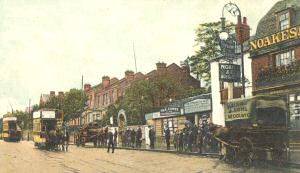Contents
- Before Development: A Place of Little Consequence
- Burrage Town: The First Estate in Plumstead
- Herbert Estate: Development on the High Slopes of Shooters Hill
- Plumstead Park Estate and the Saving of Plumstead Common
- The Plumstead Common Riots, 1876
- Bostall Estate, Abbey Wood
- Suburban Necessities: Churches, Schools, Shops and Public Houses
Plumstead: A 19th suburb of Woolwich's industrial and military might
by Barbara Ludlow
Herbert Estate: Development on the High Slopes of Shooters Hill
The British land Company crossed Plumstead Common Road and drew up plans for a new estate on the northern slopes of Shooters Hill.
In around 1860 Mr. Gates, the owner of a pottery, sold the land on which his works stood to the developers who created the Herbert Estate.
The Crimean War had a profound effect on Britain and, incompetent though the high command was, their names and the names of the battles were given to new streets throughout the country. In Plumstead the estate and its major road were named after Lord Herbert, the Secretary of War. Lord Raglan’s name had already been used on the Burrage Estate.
The Herbert Estate was built on land between Plumstead Common Road and the Dover Road as it crossed Shooters Hill. Smaller streets such as Princes Road and Barnfield Road provided housing for the less well paid, but other roads like Eglinton Hill and the southern end of Herbert Road were made up of larger houses which were popular with officers attached to the various regiments in Woolwich. Here, with views over Plumstead and the river, were households with live-in servants.
In the early 1870s roller-skating crossed the Atlantic and it soon became fashionable to go to a roller skating rink. The up and coming Herbert Estate had just such a place in the new Herbert Park, the site today of Eglinton School. The park had its “fifteen minutes of fame” in November 1878 when William Gladstone, the Prime Minister, bade farewell to his constituents at the skating rink. His association with Plumstead came about through the creation of the Parliamentary Borough of Greenwich in 1832. Deptford, Greenwich, Woolwich, part of Charlton and the extreme west of Plumstead became a constituency, which returned two men to Westminster.
In 1837 only forty-five Plumstead men were eligible to vote in the Parliamentary Borough of Greenwich; another sixty-four were registered as voters in the West Kent constituency.
By 1861 the population of Woolwich was 41,695 and Plumstead’s population had grown to 24,502. It was many of these new town voters, given the right to vote in 1867, who returned Gladstone in 1868 as one of the MPs for Greenwich.
They quickly became disillusioned when Deptford and Woolwich royal dockyards were closed in September 1869, although Gladstone was returned to Parliament again in 1874 by his Greenwich voters. The Greenwich Liberals became too radical for Gladstone and, on November 30th 1878, he went to Greenwich to speak at the Ship Hotel.
After saying goodbye to the Greenwich voters he proceeded to Woolwich and Plumstead. In the Herbert Park Roller Skating Rink he spoke to about three thousand people for two hours. It was a long goodbye. A plaque on Eglinton School reads “ On this site the Rt. Hon. W. E. Gladstone delivered his last speech to his Greenwich constituents.”
